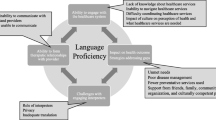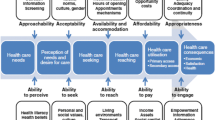Summary
This small-scale study attempts to examine the languages spoken in medical consultations during a one-month period in an outpatient clinic in Geneva and the ways health professionals use to communicate with their allophone patients, in particular by using interpreters. Patients of foreign origin accounted for 58% of all the consultations during the survey. Of these, 37% were Non-French-speakers (NFS). The four major language groups of NFS were Albanian, Somali, Tamil and Serbo-croat. Qualified interpreters were used in 24% of the consultations, relatives acting as interpreters in 17%, and in the other consultations without anyone interpreting (59%), a common language had to be negotiated: French, English, Italian, Spanish or German. In only 14% of the consultations without interpreters, both patient's and doctors ability to speak a common language was rated as good. Our data suggest that there has been an increasing awareness of the possible language barriers in the medical outpatient clinic. Even if proxy solutions (informal interpreters or the use of a common language) still play an important role, access to an interpreter service has been widely used. This calls for systematic and regular interpreter use, planning the interpreting needs in a timely manner. In the future, training in working with interpreters should become an integral part to the introductory sessions for the junior physicians assigned to the outpatient clinic.
Zusammenfassung
Die vorliegende Studie untersucht, welche Sprachen in den Sprechstunden einer Poliklinik in Genf vorkommen, und wie die Ärzte mit ihren fremdsprachigen Patienten kommunizieren. 58% der Sprechstunden, die während eines Monats untersucht wurden, betrafen ausländische Patienten. Von diesen sprachen 37% sprachen nicht französisch. Die vier grössten Sprachgruppen waren Albanisch, Somali, Tamilisch und Serbokroatisch. Qualifizierte Übersetzer wurden in 24% der Sprechstunden beigezogen, Angehörige und Freunde sprangen in 17% der Sprechstunden als Übersetzer ein, und in den restlichen Sprechstunden (59%) musste eine gemeinsame Sprache gefunden werden, das waren (in dieser Reihenfolge) Französisch, Englisch, Italienisch, Spanisch und Deutsch. In nur 14% dieser Sprechstunden wurden die Sprachkenntnisse sowohl des Patienten wie des Arztes als gut beurteilt. Die Resultate dieser Untersuchung zeigen, dass die Sprachbarrieren in der Poliklinik zu einem anerkannten Problem geworden sind. Zwar spielen Ersatzlösungen (informelle Übersetzer oder eine gemeinsame Fremdsprache) nach wie vor eine wichtige Rolle, doch wurde der Zugang zum Übersetzerdienst reichlich genutzt. Für die Zukunft bedeutet dies, dass der Übersetzungsbedarf zeitgerecht und routinemässig zu planen sein wird, sowie dass die Zusammenarbeit mit Übersetzern ein fester Bestandteil der Einführungskurses der Assistenzärzte an der Poliklinik werden sollte.
Résumé
L'objectif de cette enquête était double: recenser les langues parlées par les patients étrangers consultant à la Policlinique de médecine à Genève, et évaluer les modes de communication utilisés par les médecins face aux patients de langue étrangère. Parmi les consultations échantillonnées, 58% concernaient des patients étrangers. 37% d'entre eux ne pouvaient pas s'exprimer en français. Les langues les plus fréquemment parlées par les patients étrangers non francophones étaient, par ordre de fréquence: l'albanais, le somalien, le tamoul et le serbocroate. Dans 24% des consultations avec patients non francophones, le médecin a eu recours au service d'un interprète qualifié, tandis que dans 17% des cas, c'est un membre de la famille ou un proche du patient qui a dû servir d'interprète. Dans 59% des consultations restantes, le médecin a dû recourir à une autre langue, plus ou moins maîtrisée en commun avec le patient: essentiellement le français, l'anglais, l'italien, l'allemand et l'espagnol. Dans 14% de ces consultations sans interprètes seulement, les médecins ont jugé satisfaisante la compréhension mutuelle avec le patient. Ces résultats mettent en évidence que la barrière de langue devient une problématique croissante dans nos systèmes de soins. Si l'utilisation d'interprètes informels reste une solution de dépannage couramment utilisée, le recours systématique et planifié aux services d'interprètes qualifiés commence à se développer. Cette solution devrait être largement généralisée, de même que la formation des jeunes médecins aux techniques d'entretien avec interprètes.
Similar content being viewed by others
References
Bundesamt für Statistik. Die Sprachenlandschaft Schweiz, Eidgenössische Volkszählung 1990. Bern: BFS, 1997.
Bundesamt für Statistik. Taschenstatistik der Schweiz 1999. Bern: BFS, 1999.
Shah NM, Shah MA, Behbehani J. Ethnicity, nationality and health care accessibility in Kuwait: a study of hospital emergency room users. Health Policy and Planning 1996;11(3): 319–328.
Vranjes N, Bisig B, Gutzwiller. Gesundheit der Ausländer in der Schweiz. Bern: Bundesamt für Gesundheit, 1996.
Loutan L. Soigner des migrants: une affaire de spécialistes ou de généralistes? In: Grenzübergänge — A travers les frontières-Attraverso i confini (Schweizerische Gesellschaft für Psychiatrie, 169. Jahresversammlung und Tagung). Lugano, 1993.
Woloshin S, Schwartz LM, Katz SJ, Welch HG. Is language a barrier to the use of preventive services? J Gen Intern Med 1997;12 (8): 472–477.
Fox SA, Stein JA. The effect of Physician-Patient communication on mammography utilization by different ethnic groups. Medical Care 1991;29 (11): 1065–1082.
O'Neil. The cultural and political context of patient dissatisfaction in cross-cultural clinical encounters: a Canadian Inuit Study. Medical Anthropology Quarterly 1989;3: 325–340.
Favrat B, Francillon C, Burnand B, Pécoud A, Decrey H. La «satisfaction» du médecin lors d'une première consultation diffère-t-elle selon l'origine du patient? Schweiz Med Wochenschr 1994;124, 1955–1958.
Blöchliger C, Osterwalder J, Hatz, Tanner M, Junghanss T. Asylsuchende und Flüchtlinge in der Notfallstationstation. Soz Präventivmed 1998;43(1): 39–48.
Blöchliger C, Ries N, Gonon M, Loutan L, Mark K, Vetterli S, Tanner M, Hatz Ch, Junghanss. Asylsuchend und Flüchtlinge in der medizinischen Poliklinik: Ein Vergleich zwischen den Polikliniken Basel, Bern und Genf. Soz Präventivmed 1998;43(1): 29–38.
Baker DW, Parker RM, Williams MV, Coates WC, Pitkin K. Use and Effectiveness of Interpreters in an Emergency Department. JAMA 1996;275 (10): 783–788.
Bollini P, Siem H. No real progress towards equity: health of migrants and ethnic minorities on the eve of the year 2000. Soc Sci Med 1995;41 (6): 819–828.
Flubacher P. Eine Übersetzerin in der Hausarztpraxis, Kommunikation mit fremdsprachigen Patienten. Soziale Medizin 1994;6: 20–22.
Müllejans R, Pala A. Psychotherapie mit Dolmetscherinnen. Psycho 1999;25: 123–130.
Bischoff A, Loutan L. A mots ouverts, guide de l'entretien médical bilingue à l'usage des soignants et des interprètes. Genève: Hôpitaux Universitaires de Genève, 1998.
Author information
Authors and Affiliations
Corresponding author
Rights and permissions
About this article
Cite this article
Bischoff, A., Tonnerre, C., Loutan, L. et al. Language difficulties in an Outpatient Clinic in Switzerland. Soz Präventivmed 44, 283–287 (1999). https://doi.org/10.1007/BF01358978
Issue Date:
DOI: https://doi.org/10.1007/BF01358978




